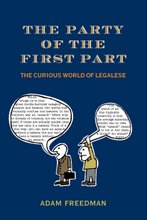By popular demand, we've extended the deadline for submitting entries to the Second Annual Golden Gobbledygook Award to October 28th!
Yes, Golden Gobbledygook -- the coveted prize for the best example of bad legalese. You can post your entry right here at the blog (as a comment to this post), or just send the worst example of legalese you can lay your hands on to POFP (adamjfreedman@yahoo.com).
The top three winners will get a boxed set (without the box) of the new paperback edition of my book The Party of the First Part, together with the Vocabula Review's new essay collection (a must for all language lovers): Vocabula Bound 2: Our Wresting, Writhing Tongue. Our distinguished panel of judges will announce the winners here at the POFP blog!
Sunday, October 12, 2008
Sunday, October 5, 2008
Word of the Week
Golden Parachute
An "excessive" severance payment to an executive. Recent coverage of the Economic Stabilization Act of 2008 (aka the "bailout bill") mentioned that Congress would restrict the "golden parachutes" available to companies that sold troubled assets to the Treasury. Many assumed that the media were just speaking informally, but in fact the "Golden Parachute Rule" is enshrined in the Tax Code -- imposing a 20% excise tax (on top of income tax) on any severance payment that is more than 300% of the executive's recent average annual pay.
Legal Brainteaser: What's a Country?
Sure, you're a little bit country. But what if your country isn't really a "country"?
This question -- or something like it -- recently gripped the Ninth Circuit when reviewing a deportation order against Nikolay Dzyuba. The Bureau of Immigration Appeals had ordered Dzyuba deported to the Ukraine, which they considered to the be the "country" from which he had entered the US back in 1991. The problem is that when Dzyuba entered the US, on July 5, 1991, the Ukraine was still part of the Soviet Union. It did not gain its independence until August 24, 1991 -- seven weeks after Dzyuba's entry.
This argument sent the judges scrambling for their copy of Webster's Third New International Dictionary but that Dictionary says that "country" can be either an independent political entity or a geographic region. As is sadly typical in modern "descriptivist" dictionaries, Webster's indicates no preference for either meaning. The question ultimately proved too daunting for the Circuit -- they kicked the case back to the Bureau of Immigration Appeals to decide whether pre-independence Ukraine was a "country."
Any bets on what they'll decide?
This question -- or something like it -- recently gripped the Ninth Circuit when reviewing a deportation order against Nikolay Dzyuba. The Bureau of Immigration Appeals had ordered Dzyuba deported to the Ukraine, which they considered to the be the "country" from which he had entered the US back in 1991. The problem is that when Dzyuba entered the US, on July 5, 1991, the Ukraine was still part of the Soviet Union. It did not gain its independence until August 24, 1991 -- seven weeks after Dzyuba's entry.
This argument sent the judges scrambling for their copy of Webster's Third New International Dictionary but that Dictionary says that "country" can be either an independent political entity or a geographic region. As is sadly typical in modern "descriptivist" dictionaries, Webster's indicates no preference for either meaning. The question ultimately proved too daunting for the Circuit -- they kicked the case back to the Bureau of Immigration Appeals to decide whether pre-independence Ukraine was a "country."
Any bets on what they'll decide?
Subscribe to:
Posts (Atom)

